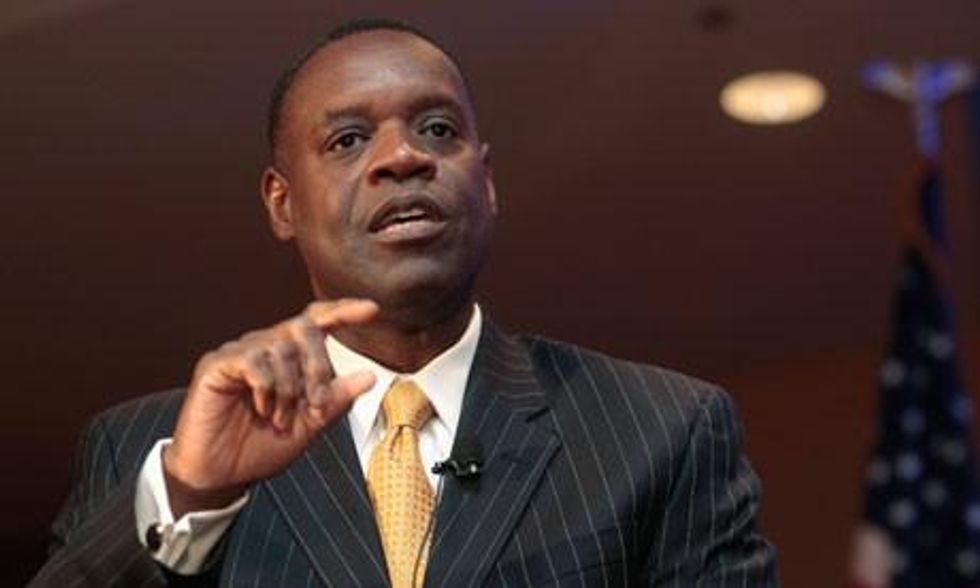How Wall Street is Bleeding Detroit Dry
Report finds worker and retiree pensions are not the culprit

Released by Wallace Turbeville, a former Goldman Sachs investment banker who now works for the think tank Demos, the study takes aim at Detroit emergency manager Kevyn Orr's claims that workers and retirees are to blame for Detroit's shortfall.
"To say the pension fund killed the city, it's like if you were stabbed, strangled and blown up, did you die from the strangling?" Turbeville said, according to The Huffington Post. "That's why I find this whole thing illogical, except for the fact somebody didn't like pensions."
Turbeville singles out Detroit's risky financial dealings with big banks as "a great threat to the city." In 2005 and 2006, the city financed its $1.6 billion in debt through a series of complex swap deals with "hidden risks." The report explains,
The deals included provisions that would allow the banks to terminate the swaps under specified conditions and collect termination payments, which would entitle the banks to immediate payment of all projected future value of the swaps to the bank counterparties. Such conditions included a credit rating downgrade of the city to a level below "investment grade," appointment of an emergency manager to run the city and failure of the city to make timely payments.
Turbeville states, "These swap deals were particularly ill-suited for a city like Detroit, which had been hovering on the edge of a credit rating downgrade for years... A strong case can be made that the banks that sold these swaps may have breached their ethical, and possibly legal, obligations to the city in executing these deals."
Furthermore, massive tax subsidies to corporations--which climbed as high as $20 million annually--were a "burden on city revenues at a time when it was particularly damaging," the report finds. These revenues were further depleted by unemployment and depopulation connected the Great Recession. This coincided with a reduction of Michigan state sharing of revenue.
Contrary to widespread belief, Detroit's overall spending is not the culprit behind the city's shortfall and in fact decreased 38 percent since the Great Recession. Rather, it was declining revenue, "exacerbated by complicated Wall Street deals," that threatened Detroit's ability to pay its expenses, the study finds.
The report accuses Orr of grossly inflating Detroit's alleged $18 billion in debt to accelerate the push for bankruptcy filings. "While emergency manager Kevyn Orr has focused on cutting retiree benefits and reducing the city's long-term liabilities to address the crisis, an analysis of the city's finances reveals that his efforts are inappropriate and, in important ways, not rooted in fact," the report concludes.
The study comes as Detroit's bankruptcy case makes its way through the courts. Orr has been slammed by unions for forcing through bankruptcy proceedings with the support of Michigan Governor Rick Snyder in a bid to subvert local democratic process and state law. Orr has been blasted for gutting public services and diverting public dollars to pay off the big banks largely responsible for the city's financial spiral while threatening workers' hard-earned pensions.
_____________________
An Urgent Message From Our Co-Founder
Dear Common Dreams reader, The U.S. is on a fast track to authoritarianism like nothing I've ever seen. Meanwhile, corporate news outlets are utterly capitulating to Trump, twisting their coverage to avoid drawing his ire while lining up to stuff cash in his pockets. That's why I believe that Common Dreams is doing the best and most consequential reporting that we've ever done. Our small but mighty team is a progressive reporting powerhouse, covering the news every day that the corporate media never will. Our mission has always been simple: To inform. To inspire. And to ignite change for the common good. Now here's the key piece that I want all our readers to understand: None of this would be possible without your financial support. That's not just some fundraising cliche. It's the absolute and literal truth. We don't accept corporate advertising and never will. We don't have a paywall because we don't think people should be blocked from critical news based on their ability to pay. Everything we do is funded by the donations of readers like you. Will you donate now to help power the nonprofit, independent reporting of Common Dreams? Thank you for being a vital member of our community. Together, we can keep independent journalism alive when it’s needed most. - Craig Brown, Co-founder |

Released by Wallace Turbeville, a former Goldman Sachs investment banker who now works for the think tank Demos, the study takes aim at Detroit emergency manager Kevyn Orr's claims that workers and retirees are to blame for Detroit's shortfall.
"To say the pension fund killed the city, it's like if you were stabbed, strangled and blown up, did you die from the strangling?" Turbeville said, according to The Huffington Post. "That's why I find this whole thing illogical, except for the fact somebody didn't like pensions."
Turbeville singles out Detroit's risky financial dealings with big banks as "a great threat to the city." In 2005 and 2006, the city financed its $1.6 billion in debt through a series of complex swap deals with "hidden risks." The report explains,
The deals included provisions that would allow the banks to terminate the swaps under specified conditions and collect termination payments, which would entitle the banks to immediate payment of all projected future value of the swaps to the bank counterparties. Such conditions included a credit rating downgrade of the city to a level below "investment grade," appointment of an emergency manager to run the city and failure of the city to make timely payments.
Turbeville states, "These swap deals were particularly ill-suited for a city like Detroit, which had been hovering on the edge of a credit rating downgrade for years... A strong case can be made that the banks that sold these swaps may have breached their ethical, and possibly legal, obligations to the city in executing these deals."
Furthermore, massive tax subsidies to corporations--which climbed as high as $20 million annually--were a "burden on city revenues at a time when it was particularly damaging," the report finds. These revenues were further depleted by unemployment and depopulation connected the Great Recession. This coincided with a reduction of Michigan state sharing of revenue.
Contrary to widespread belief, Detroit's overall spending is not the culprit behind the city's shortfall and in fact decreased 38 percent since the Great Recession. Rather, it was declining revenue, "exacerbated by complicated Wall Street deals," that threatened Detroit's ability to pay its expenses, the study finds.
The report accuses Orr of grossly inflating Detroit's alleged $18 billion in debt to accelerate the push for bankruptcy filings. "While emergency manager Kevyn Orr has focused on cutting retiree benefits and reducing the city's long-term liabilities to address the crisis, an analysis of the city's finances reveals that his efforts are inappropriate and, in important ways, not rooted in fact," the report concludes.
The study comes as Detroit's bankruptcy case makes its way through the courts. Orr has been slammed by unions for forcing through bankruptcy proceedings with the support of Michigan Governor Rick Snyder in a bid to subvert local democratic process and state law. Orr has been blasted for gutting public services and diverting public dollars to pay off the big banks largely responsible for the city's financial spiral while threatening workers' hard-earned pensions.
_____________________

Released by Wallace Turbeville, a former Goldman Sachs investment banker who now works for the think tank Demos, the study takes aim at Detroit emergency manager Kevyn Orr's claims that workers and retirees are to blame for Detroit's shortfall.
"To say the pension fund killed the city, it's like if you were stabbed, strangled and blown up, did you die from the strangling?" Turbeville said, according to The Huffington Post. "That's why I find this whole thing illogical, except for the fact somebody didn't like pensions."
Turbeville singles out Detroit's risky financial dealings with big banks as "a great threat to the city." In 2005 and 2006, the city financed its $1.6 billion in debt through a series of complex swap deals with "hidden risks." The report explains,
The deals included provisions that would allow the banks to terminate the swaps under specified conditions and collect termination payments, which would entitle the banks to immediate payment of all projected future value of the swaps to the bank counterparties. Such conditions included a credit rating downgrade of the city to a level below "investment grade," appointment of an emergency manager to run the city and failure of the city to make timely payments.
Turbeville states, "These swap deals were particularly ill-suited for a city like Detroit, which had been hovering on the edge of a credit rating downgrade for years... A strong case can be made that the banks that sold these swaps may have breached their ethical, and possibly legal, obligations to the city in executing these deals."
Furthermore, massive tax subsidies to corporations--which climbed as high as $20 million annually--were a "burden on city revenues at a time when it was particularly damaging," the report finds. These revenues were further depleted by unemployment and depopulation connected the Great Recession. This coincided with a reduction of Michigan state sharing of revenue.
Contrary to widespread belief, Detroit's overall spending is not the culprit behind the city's shortfall and in fact decreased 38 percent since the Great Recession. Rather, it was declining revenue, "exacerbated by complicated Wall Street deals," that threatened Detroit's ability to pay its expenses, the study finds.
The report accuses Orr of grossly inflating Detroit's alleged $18 billion in debt to accelerate the push for bankruptcy filings. "While emergency manager Kevyn Orr has focused on cutting retiree benefits and reducing the city's long-term liabilities to address the crisis, an analysis of the city's finances reveals that his efforts are inappropriate and, in important ways, not rooted in fact," the report concludes.
The study comes as Detroit's bankruptcy case makes its way through the courts. Orr has been slammed by unions for forcing through bankruptcy proceedings with the support of Michigan Governor Rick Snyder in a bid to subvert local democratic process and state law. Orr has been blasted for gutting public services and diverting public dollars to pay off the big banks largely responsible for the city's financial spiral while threatening workers' hard-earned pensions.
_____________________

